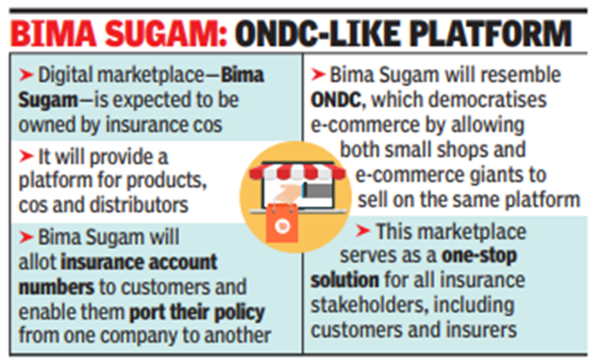The marketplace is expected to be owned by insurance companies. Besides providing a platform for products, companies and distributors, Bima Sugam will allot insurance account numbers to customers and enable them to port their policy from one company to another.
Irdai chairman Debasish Panda had earlier said that Bima Sugam would be a UPI-like moment for the insurance industry. Other than buying and selling insurance, insurance companies would be able to plug into the platform through API (application programming interface) to even service claims. It is not aimed at putting online distributors out of business as they can also be part of the platform.

“This marketplace serves as a one-stop solution for all insurance stakeholders, including customers, insurers, intermediaries, and agents, thereby promoting transparency, efficiency, and collaboration across the entire insurance value chain,” Irdai said in a statement.
Industry experts said that Bima Sugam would resemble ONDC (Open Network for Digital Commerce), which democratises e-commerce by allowing both small shops and e-commerce giants to sell on the same platform. Small businesses are supported by service providers for logistics and other requirements.
Irdai board this week replaced 34 regulations with six and also approved the setting up of Galaxy Health and Allied Insurance company by the former promoter of Star Health. Galaxy Health is the sixth insurance registration to be granted by the regulator in around one year and takes the total number of standalone health insurers to seven. Earlier this year, the regulator had granted in-principle approval to Narayana Health to set up a health insurance business in India.
Two old regulations about insurers’ minimum business duties in rural, social sector, and motor third-party areas, as required by the Insurance Act, 1938, are now combined. Changes are made to how these obligations are measured: for rural duties, it’s now measured by Gram Panchayat, social sector includes cardholders and scheme beneficiaries, and motor third-party obligations are measured by insurance renewal for certain vehicles.
The new regulations cover rural, social sector, and motor third-party obligations, establish the Bima Sugam digital marketplace, streamline insurer registration, governance, and product offerings, regulate foreign reinsurers, and enhance actuarial and financial functions while prioritising policyholder protection.

